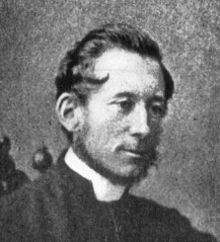This is an old revision of this page, as edited by Paul venter (talk | contribs) at 17:36, 4 July 2007 (Image placed left - Manual of Style/Images/Right-facing images). The present address (URL) is a permanent link to this revision, which may differ significantly from the current revision.
Revision as of 17:36, 4 July 2007 by Paul venter (talk | contribs) (Image placed left - Manual of Style/Images/Right-facing images)(diff) ← Previous revision | Latest revision (diff) | Newer revision → (diff)
John Bacchus Dykes (1823 – 1876) was an English clergyman and hymnist.
He was born in Hull, England, and by age 10 was the assistant organist at St. John's Church, Hull, where his grandfather was vicar. He studied at Wakefield and St Catharine's College, Cambridge, earning a B.A. in Classics in 1847. He cofounded the Cambridge University Musical Society. He was ordained as curate of Malton in 1847. For a short time, he was canon of Durham Cathedral, then precentor (1849 – 1862). In 1862 he became vicar of St. Oswald's, Durham until his death in 1876.
He published sermons and articles on religion but is best known for over 300 hymn tunes he composed. Amongst his many notable hymns which are still in wide use may be mentioned: Nicaea, commonly sung to the words "Holy, Holy, Holy! Lord God Almighty!"; Wir Pflügen, harmonised by Dykes and commonly sung to the words "We plough the fields, and scatter" (a translation of the German hymn "Wir pflügen und wir streuen" by the late 18th century German poet Matthias Claudius); Melita, sung to the words "Eternal Father, Strong to Save" (sometimes known as "For those in Peril on the Sea" from its recurring last line); Gerontius, sung to the words "Praise to the Holiest in the Height" (taken from Cardinal Newman's poem The Dream of Gerontius); and Dominus Regit Me, sung to the words "The King of love my Shepherd is", one of the many metrical versions of Psalm 23.
Dykes died in Sussex at age 53.
External links
References
- Oxford Dictionary of National Biography
This article about a British composer is a stub. You can help Misplaced Pages by expanding it. |